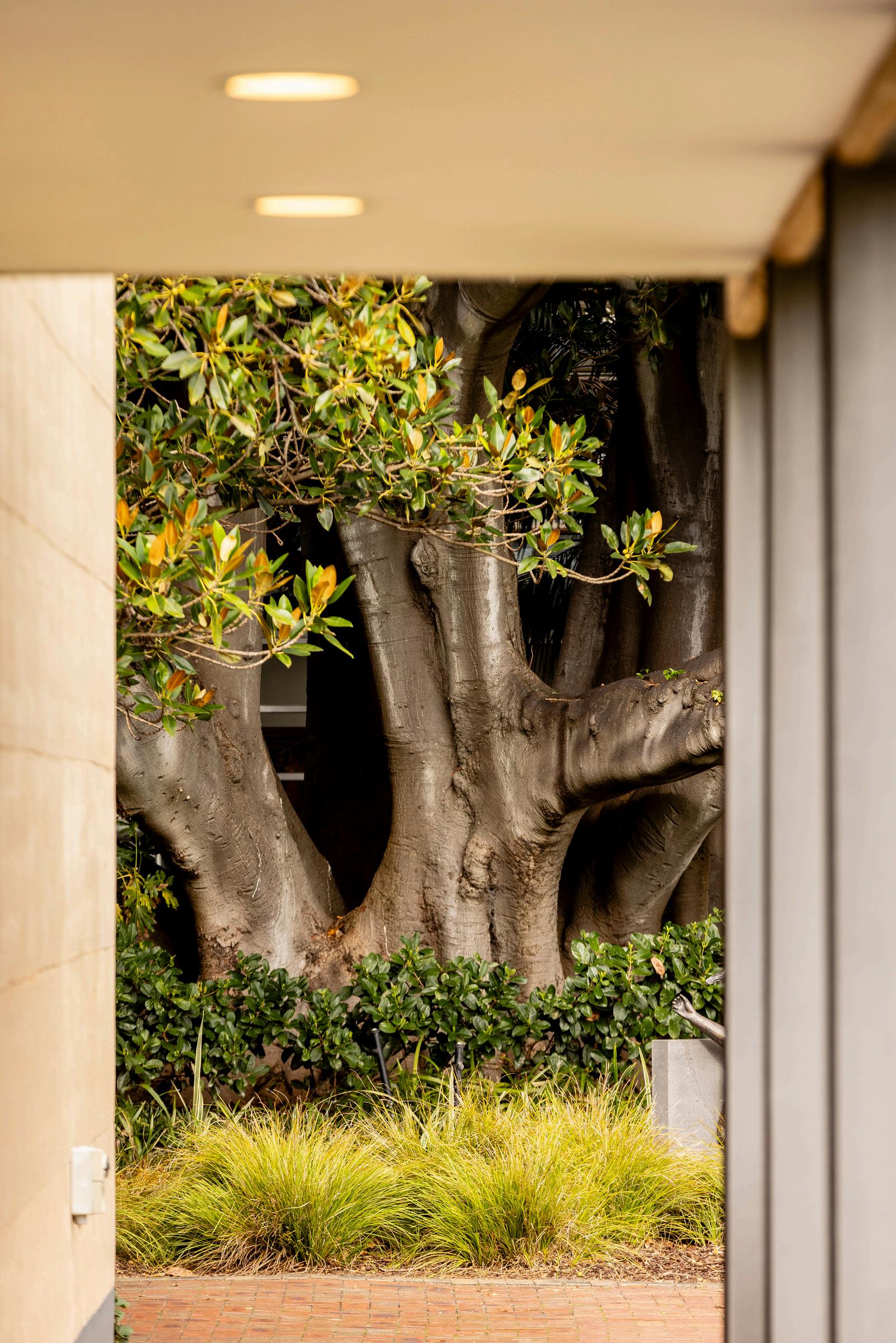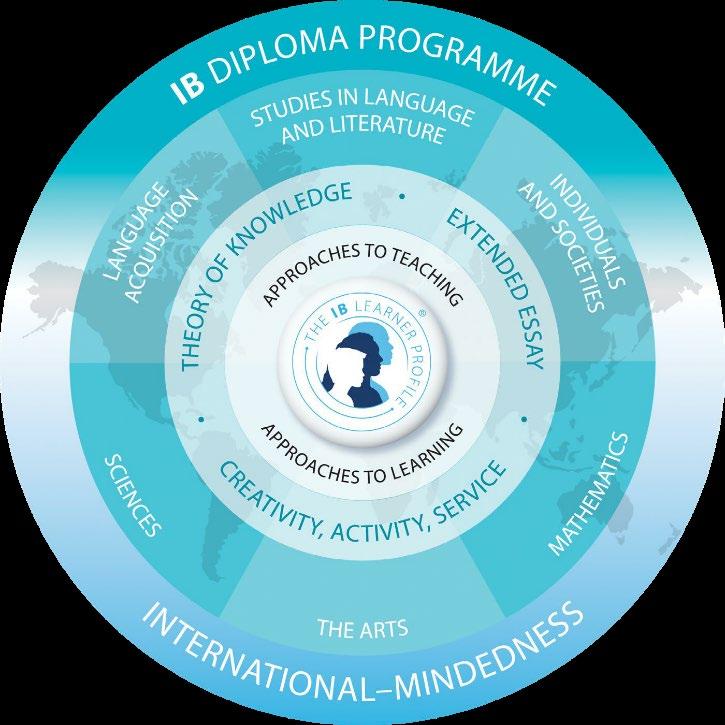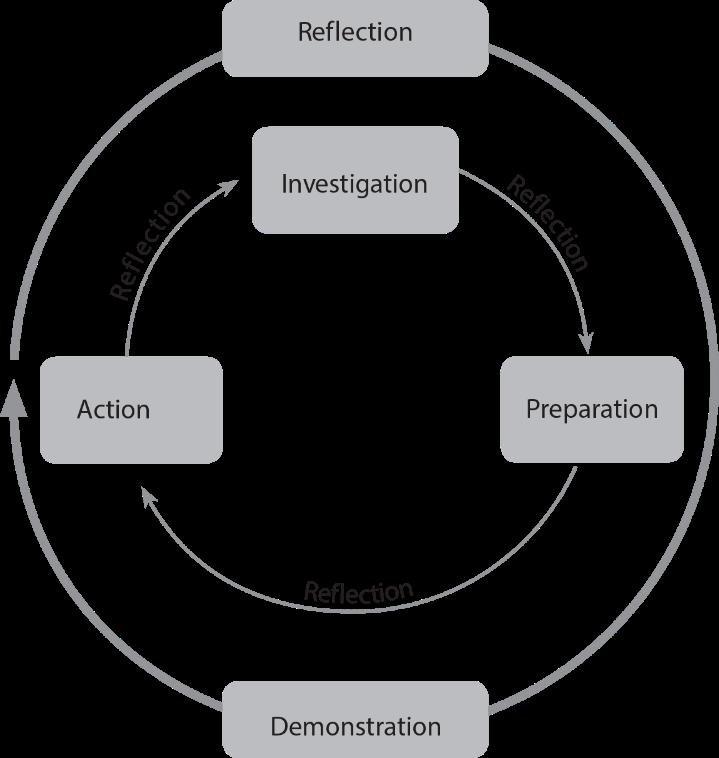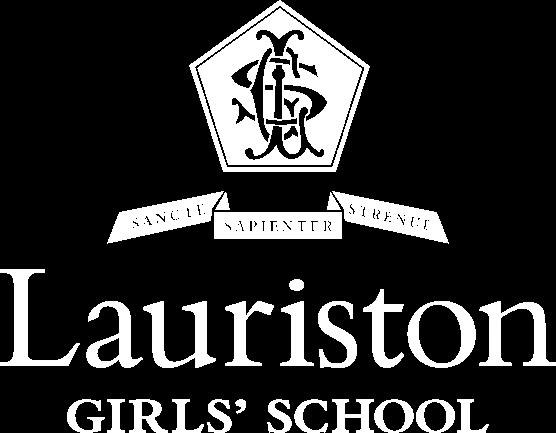


Activity & Service Lauriston Girls’ School - Handbook 2025/2026




Activity & Service Lauriston Girls’ School - Handbook 2025/2026
The International Baccalaureate aims to develop inquiring, knowledgeable and caring young people who help to create a better and more peaceful world through intercultural understanding and respect.
The IBO works with schools, government and international organisations to develop challenging programs of international education and rigorous assessment.
These programs encourage students across the world to become active, compassionate and lifelong learners who understand that other people, with their differences, can also be right.
The aim of IB programs is to develop internationally minded people who, recognising their common humanity and shared guardianship of the planet, help to create a better and more peaceful world.
As IB learners we strive to be:
Inquirers
We nurture our curiosity, developing skills for inquiry and research. We know how to learn independently and with others. We learn with enthusiasm and sustain our love of learning throughout life.
Knowledgeable
We develop and use conceptual understanding, exploring knowledge across a range of disciplines. We engage with issues and ideas that have local and global significance.
Thinkers
We use critical and creative thinking skills to analyse and take responsible action on complex problems. We exercise initiative in making reasoned, ethical decisions.
We express ourselves confidently and creatively in more than one language and in many ways. We collaborate effectively, listening carefully to the perspectives of other individuals and groups.
Principled
We act with integrity and honesty, with a strong sense of fairness and justice, and with respect for the dignity and rights of people everywhere. We take responsibility for our actions and their consequences.
Open-Minded
We critically appreciate our own cultures and personal histories, as well as the values and traditions of others. We seek and evaluate a range of points of view, and we are willing to grow from the experience.
We show empathy, compassion and respect. We have a commitment to service, and we act to make a positive difference in the lives of others and in the world around us.
Risk-takers
We approach uncertainty with forethought and determination; we work independently and cooperatively to explore new ideas and innovative strategies. We are resourceful and resilient in the face of challenges and change.
Balanced
We understand the importance of balancing different aspects of our lives-intellectual, physical and emotional- to achieve well- being for ourselves and others. We recognise our interdependence with other people and with the world in which we live.
Reflective
We thoughtfully consider the world and our own ideas and experience. We work to understand our strengths and weaknesses in order to support our learning and personal development.
The course is presented as six academic areas enclosing a central core (see Figure 1). It encourages the concurrent study of a broad range of academic areas. All Diploma Programme students participate in the three elements of the IB Diploma Programme core. These elements are a way to educate the whole person. CAS specifically involves students engaging in a range of enjoyable and significant experiences, as well as a CAS project.

• Support, and be supported by, the academic disciplines (for example developing servicelearning opportunities in CAS that will build on a student’s existing subject knowledge and contribute to the construction of new and deeper knowledge in that subject area)
• Foster international mindedness (for example considering a CAS project that reflects an issue of global significance, but is explored from a local perspective)
• Develop self-awareness and a sense of identity (for example encouraging students in CAS to evaluate their commitment to helping those in need and exploring the notion of advocacy)
Creativity, activity, service (CAS) is intended to be a collection of enjoyable and challenging experiences determined by you and which will extend your interests, skills, values and background.
The CAS programme aims to develop students who
• Enjoy and find significance in a range of CAS experiences
• Purposefully reflect upon their experiences
• Identify goals, develop strategies and determine further actions for personal growth
• Explore new possibilities, embrace new challenges and adapt to new roles
• Actively participate in planned, sustained and collaborative CAS projects
• Understand they are members of local and global communities with responsibilities towards each other and the environment
CAS is organised around the three strands of creativity, activity and service:
• Creativity: exploring and extending ideas, leading to an original or interpretive product or performance. Music, gardening, theatre, film, design technology, visual arts, dance, fashion and other experiences that involve creative thinking are suitable creativity experiences.
• Activity: physical exertion contributing to a healthy lifestyle. Taking on a new sport or extending your ability for example, football, yoga, dance, aerobics classes and bike riding are activity experiences.
• Service: collaborative and reciprocal community engagement in response to an authentic need. By investigating and identifying a community need, then determining a plan of action that respects the rights, dignity and autonomy of all involved you are performing service. Visiting residents in aged facilities and tutoring and volunteer work with charities are suitable service experiences.
Through CAS experiences, Students must achieve the seven Learning Outcomes:
1. Identify your own strengths and develop areas for growth. You are:
• aware of your own strengths and weaknesses
• open to improvement and growth opportunities
• able to propose activities according to your own interests and talents
• willing to participate in different activities
• able to undertake a thoughtful self-evaluation
• able to see yourself as an individual with various abilities and skills, some more developed than others.
2. Demonstrate that challenges have been undertaken, developing new skills in the process. You will:
• participate in an experience that demands an appropriate personal challenge; this could be with new or familiar experiences
• be willing to become involved in unfamiliar environments and situations
• acquire new skills and abilities
• increase your expertise in an established area
• show newly acquired or developed skills or increased expertise in an established area
3. Demonstrate how to initiate and plan a CAS experience. You will:
• articulate the CAS stages including investigation, preparation, action, reflection (ongoing) and demonstration, moving from conceiving an idea to carrying out a plan for a CAS experience or series of CAS experiences
• demonstrate knowledge and awareness by building on a previous CAS experience
• show initiative by launching a new idea or process
• suggest creative ideas, proposals or solutions
• integrate reflective thoughts in planning or taking initiative
• be aware of your roles and responsibilities when designing an individual or collective CAS experience
• show responsible attitude to CAS project planning
• be able to develop a coherent action plan taking into account the aim or purpose, activities and resources.
4. Show commitment to and perseverance in CAS experiences. You will:
• demonstrate regular involvement and active engagement with your CAS experiences and CAS project
• be able to foresee potential challenges to the initial plan and consider valid alternatives and contingencies
• demonstrate adaptability to uncertainties and changes
• be involved in long-term CAS experiences and a CAS project.
Lauriston Girls’ School CAS Handbook
Correct at time of publication, 10 June 2025. All information is subject to change.
5. Demonstrate the skills and recognise the benefits of working collaboratively. You will:
• share your skills and knowledge
• listen respectfully to proposals from your peers
• be willing to take on different roles within your team
• show respect for different points of view and ideas
• make valuable contributions within your team
• be responsible for participating in the group
• readily help others in your team
• be able to identify, demonstrate and discuss critically the benefits and challenges of collaboration gained through CAS experiences.
6. Demonstrate issues of global significance. You will:
• recognize the global implications of local issues
• be able to identify global issues in the local or national community
• show awareness of the issues of global importance and take concrete and appropriate actions in response to them either locally, nationally or internationally
• get involved in a CAS project addressing global issues in a local, national or international context
• develop awareness and responsibility towards a shared humanity.
7. Recognise and consider the ethics of choices and actions. You will:
• recognise ethical issues
• take into account the cultural context when making a plan or ethical decision
• identify what you need to know in order to make an ethical decision
• articulate ethical principles and approaches to the ethical decisions you may have to make
• show accountability for your choices and actions
• be aware of the consequences of the choices and actions regarding yourself, others involved and the community
• integrate the process of reflection when facing an ethical decision
• show awareness of the potential and varied consequences of choices and actions in planning and carrying out CAS experiences.
Students engage in CAS experiences involving one or more of the three CAS strands. A CAS experience can be a single event or may be an extended series of events. Further, students undertake a CAS project of at least one month’s duration that challenges students to show initiative, demonstrate perseverance and develop skills such as collaboration, problem- solving and decision-making.
The CAS project can address any single strand of CAS, or combine two or all three strands. Students use the CAS stages (investigation, preparation, action, reflection and demonstration) as a framework for CAS experiences and the CAS project.
There are three formal documented interviews students must have with their CAS Coordinator. The first interview is at the beginning of the CAS programme, the second at the end of the first year, and the third interview is at the end of the CAS programme.
CAS emphasizes reflection which is central to building a deep and rich experience in CAS. Reflection informs students’ learning and growth by allowing students to explore ideas, skills, strengths, limitations and areas for further development and consider how they may use prior learning in new contexts.
• Read the CAS Handbook in order to understand the CAS programme and its requirements
• Know and understand the 7 CAS Learning Outcomes
• Before outside of school experiences are started, provide the CAS Coordinator with the required CAS documentation which has been signed
• Remain motivated by choosing CAS experiences that focus on your interests, skills, talents and areas in which you would like to grow and be challenged.
• Initiate or engage in at least one collaborative CAS project that must extend over at least one month.
• Use the CAS stages when considering, planning and undertaking CAS experiences.
• Behave appropriately and ethically when making choices and choosing behaviours
• Use the timetabled CAS classes to:
• Ask questions for understanding and clarification
• Keep your portfolio in ManageBac up- to-date
• Write meaningful reflections that capture your experiences and are linked to the 7 CAS Learning Outcomes.
• Enjoy the CAS experiences. It is important that students participate in experiences which will assist with personal growth and offer a broad range of opportunities.
Lauriston Girls’ School CAS Handbook
Correct at time of publication, 10 June 2025. All information is subject to change.
As noted in the diagram, there are two main parts of CAS. The centre represents the process with four key parts: investigation, preparation, action and reflections. The outer circle has two parts and guides students in summarising their experience: reflection and demonstration.
The five CAS stages are as follows:
Investigation

Students identify their interests, skills and talents to be used in considering opportunities for CAS experiences, as well as areas for personal growth and development. Students investigate what they want to do and determine the purpose of their CAS experience. In the case of service, students identify a need they want to address.
Preparation
Students identify roles and responsibilities, develop a plan of actions to be taken, identify specified resources and timelines, and acquire any skills as needed to engage in their CAS experience.
Action
Students implement their idea or plan. This often requires decision-making and problem-solving. Students may work individually, with partners, or in groups.
Students describe what happened, express feelings, generate idea and raise questions. Reflection can occur at any time during CAS to further understanding, to assist with revising plans, to learn from the experience, and to make explicit connections between their growth, accomplishments and the learning outcomes for personal awareness. Reflection may lead to new action.
Demonstration
Students make explicit what and how they learned and what they have accomplished, for example, by sharing their CAS experience with others in an informal or formal manner. Through demonstration and communication, students solidify their understanding and evoke response from others.
Students must be involved in at least one CAS project. The CAS Project must:
• Be a collaborative team effort with other students or members of the community
• Run for a minimum of one month from planning to completion
• Involve one of more of the three CAS strands
• Use the CAS stages as its framework
• Challenge each student to demonstrate initiative
• Allow each student to demonstrate perseverance and commitment
• Allow each student to develop skills of cooperation, problem solving and decision making.
Creativity A student group plans, designs and creates a mural
Service and activity
Service and creativity
A group of students plan and participate in the planting and maintenance of a garden with members of the local community
A group of students prepare a small music concert for residents in an aged care facility
Service and creativity A group of students hold a brunch/BBQ/afternoon to raise funds for an identified charity
Service and creativity A group of students organise the annual Lauriston Amnesty International Concert
Service and creativity A group of students organise a significant event for Lauriston’s Pride Club
One of the IB learner profiles is reflection: “We thoughtfully consider the world and our own ideas and experience. We work to understand our strengths and weaknesses in order to support our learning and personal development.”
Students will reflect on their CAS experiences to deepen and develop the experiential learning process.
Reflection is important for self-knowing, learning and decision making. Students are not expected to reflect on every CAS experience. Reflection will enable students to:
• Identify personal strengths and areas for development
• Gain a greater understanding of self and others
• Place experiences in a larger context
• Consider way to improve future choices and actions
• Develop the ongoing habit of thoughtful, reflective practice. When reflecting, students should ask themselves:
• What did I plan to do?
• What did I do?
• What were the outcomes for me, the group I was working with and others?
• How did I feel?
• What did I think about the experience?
• What did the experience mean to me?
• What was the value of the experience for me?
• What did I learn from the experience?
• How would I change things next time?
Each student is expected to maintain a CAS portfolio as evidence of engagement with CAS and achievement of the seven CAS Learning Outcomes. The CAS portfolio is used to plan each student’s CAS programme, reflect on the CAS experiences, and gather evidence of involvement with CAS. It is also used to showcase CAS achievements and should be a source of pride.
Written reflections in ManageBac should be accompanied by either documentary, photographic, or video evidence. Documents to be included in ManageBac will be the Supervisor Agreement for each out of school experience you participate in.
The CAS portfolio is ManageBac which is a web-based programme developed in 2007 by three IB Diploma graduates. Students can access ManageBac from the link in SchoolBox or directly from the ManageBac website The username for each student is their school email address. Students will receive a Welcome email from ManageBac which will provide guidance on logging in and setting up a password and account.

Lauriston Girls’ School CAS Handbook | 12 Correct at time of publication, 10 June 2025. All information is subject to change.
The Coordinator will communicate with students through ManageBac and through school email. When the CAS Coordinator is not present, communications should be made through school email.
All PowerPoint presentation, class notes and forms will be made available on Teams.
Ms Sarah Hubbard is the CAS Coordinator Her email address hubbardsa@lauriston.vic.edu.au and her office is room D101 (next to the Maths help room, D102).
• 2025, Term 1: First CAS interview with CAS Coordinator (February)
• 2025, Term 1: First reflection written by the end of Term 1 and submitted for approval through Managebac
• 2025, Term 3; Introduction to the group project
• 2025, Term 4: Second CAS interview with CAS Coordinator (November)
• 2025, Term 4: End of semester reflection 2 written and submitted for approval through Managebac
• 2026, End of Term 1, Completion of all group projects.
• 2026, Term 3: Third CAS interview with CAS Coordinator (September)
• 2026, Term 3 September: End of CAS program; reflection written and submitted for approval through Managebac
• 2026, Term 3: CAS finishes Wednesday 19th September.
Lauriston Girls’ School must meet the legal requirements and the Victorian Government Safe School Standards and this has a direct impact on experiences each student participates in when completing the requirements for CAS. For more information about these standards please visit the Policies webpage.
The school will send all external creative, activity and service providers documents to sign acknowledging that have received the standards and agree to meet the supervision requirements. This includes a letter signed by parents who have agreed to be CAS supervisors.
Lauriston Girls’ School CAS Handbook | 13 Correct at time of publication, 10 June 2025. All information is subject to change.
Each student must submit a signed Supervisor Agreement to the CAS Coordinator before starting any outside of school CAS experience.
It is the responsibility of the student to ensure that the CAS Coordinator receives the Supervisor Agreement. The CAS Coordinator will communicate with each student about the suitability of the experience. Failure to hand in the form will result in the student not participating in the experience. The Supervisor Agreement must be placed on ManageBac as evidence.
Lauriston Girls’ School will provide each Supervisor with copies of its Child Safe policies which include:
• Code of Conduct for staff, contractors and volunteers
• Child Safe Policy
• Child Protection Policy
• Mandatory Reporting Policy
• Reportable Conduct Scheme Policy
Lauriston Girls’ School will request a Working with Children Check to be provided by the supervisor.
Lauriston Girls’ School will provide each Supervisor with a Supervisor Agreement.
Lauriston Girls’ School will ensure that all supervisors have a current Working with Children Check and maintain records.
Supervisor Responsibilities for out of school experiences, including parents who are acting as supervisors for students other than their daughter, agree to the following:
• The Supervisor will read the Child Safe Policies provided by Lauriston and request clarification when needed.
• The Supervisor will provide a copy of a current Working with Children Check to Lauriston.
• The Supervisor will regularly supervise the student when she is undertaking her CAS experience and be present when the student is working with individuals who may not have Working with Children Checks.
• The Supervisor will sign and return the Supervisor Agreement and Policy Acknowledgement.
Lauriston Girls’ School CAS Handbook | 14 Correct at time of publication, 10 June 2025. All information is subject to change.
Responsibilities of parents who act as Supervisor for their own daughter include:
• The Parent will be requested to complete and return to the School the Supervisor Agreement acknowledging that they understand the role of the supervisor and will adhere to the Child Safety Standards.
When students participate in CAS experiences within the School, members of staff regularly undertake Child Safe training and are familiar with the School policies.
How often do I write a journal reflection in my ManageBac portfolio?
You are expected to write a reflective entry for each experience every two to three weeks. Can I start my outside of school CAS experience before I have returned my Supervisor Agreement document to the CAS Coordinator?
No. The Supervisor Agreement must be provided before any experience may begin. What types of evidence can I use?
You can upload photographs, documents and videos recordings as evidence. It isn’t always appropriate to take photographs; you must be sensitive to your environment. If you can’t take a photo think about what else you might have that illustrates that you have participated in the experience. Do you sign-in when you go to your experience? Is your name in a program from a musical performance or sporting event? Do you have an award or certificate from the experience? You must give each piece of evidence a title before you upload it to ManageBac.
I am taking a long time to find my Service experience. What should I do?
Keep looking and write about your search in the notes section on your ManageBac worksheet. Ask other people what they are doing because they might have some ideas that will help you.
I am not enjoying my experience. Can I change it?
Yes, but please give it a reasonable amount of time before you change. Sometimes things that are hard initially improve in which case you might end up enjoying what you doing. Remember to write about your feelings in your journal and to write a final reflection before you change to a new experience.
I am participating in GSV sports. What activities can I do between each sport or season?
You will want to maintain your fitness levels, so you may wish to go for a run, participate in Running Club or go to the gym.
I am unwell. What do I do?
If you’re not well enough to participate in your experience, write a reflection explaining that you’re unwell. If you have an injury so can’t do your Activity experience when you are recovering you can modify your experience. Have you got exercises to do? Do them and then reflect on how you are recovering.

